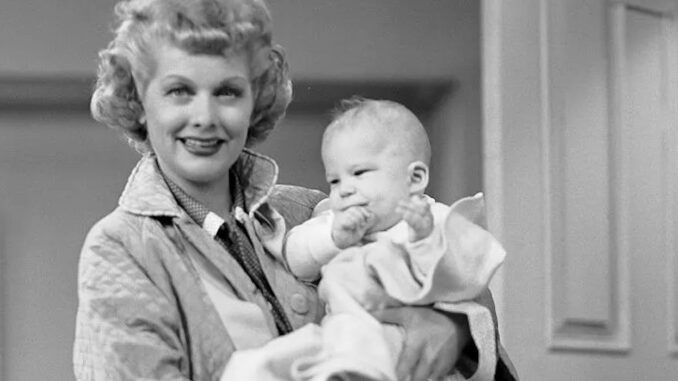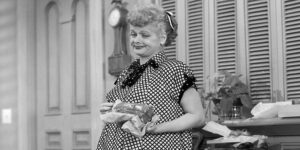
Introduction: A Groundbreaking TV Moment
Television in the 1950s was a far cry from the boundary-pushing shows we see today. Back then, even mentioning pregnancy on screen was considered taboo. Yet, I Love Lucy, the beloved sitcom starring Lucille Ball and Desi Arnaz, found a way to weave Ball’s real-life pregnancy into its storyline, breaking barriers and changing TV forever. How did the show manage to “dance” around such a controversial topic while still keeping it funny and heartwarming? Let’s dive into the fascinating story behind this groundbreaking moment in television history.
The Era of TV Censorship
Why Pregnancy Was Taboo on TV
In the 1950s, networks adhered to strict standards of decency. Words like “pregnant” were deemed too explicit for television audiences, reflecting the conservative values of the time. Shows often avoided addressing topics that could be seen as too personal or suggestive.
Lucille Ball’s Real-Life Dilemma
Lucille Ball’s unexpected pregnancy with her second child posed a challenge. As the star of I Love Lucy, her condition couldn’t simply be hidden. Instead, the creators had to decide whether to incorporate it into the storyline or film around it.
The Decision to Write in the Pregnancy
CBS’s Initial Resistance
Initially, CBS executives were hesitant. They feared backlash from conservative viewers and advertisers. A pregnant woman on prime-time TV? Unthinkable! But Lucille Ball and Desi Arnaz, who were not only the stars but also producers of the show, fought to include the storyline.
Convincing the Sponsors
Sponsors like Philip Morris, who had significant influence, were initially skeptical. However, Desi Arnaz’s charm and negotiation skills won them over. He emphasized the comedic potential of the storyline, assuring them it would be handled tastefully.
Crafting the Storyline
Dancing Around the Word “Pregnancy”
Even though the show included Ball’s pregnancy, they never once used the word “pregnant.” Instead, euphemisms like “expecting” were carefully written into the script. This creative workaround allowed the show to appease censors while still being relatable to audiences.

The Episode That Changed TV: ‘Lucy Is Enceinte’
The iconic episode where Lucy tells Ricky she’s pregnant, titled “Lucy Is Enceinte” (French for “pregnant”), aired on December 8, 1952. This clever title avoided the controversial word entirely while still getting the message across.
Behind-the-Scenes Challenges
Filming Around Lucille Ball’s Bump
As Ball’s pregnancy progressed, the wardrobe team used creative techniques to conceal her growing belly in earlier episodes. Loose-fitting clothing and strategically placed props became staples on set.
Writing Comedy Around Real Life
The writers turned Ball’s pregnancy into a treasure trove of comedic moments. From Lucy’s quirky cravings to Ricky’s over-the-top reactions, the episodes were both hilarious and heartfelt.
Audience Reception
Breaking Records
The episode where Lucy gives birth to Little Ricky aired on January 19, 1953, and drew an audience of over 44 million viewers—more than President Eisenhower’s inauguration broadcast the next day. It was clear that audiences loved the relatable and groundbreaking storyline.
Cultural Impact
This storyline resonated with viewers across the country, as many women had never seen their experiences reflected on TV before. Lucille Ball became a trailblazer for showcasing real-life issues in a comedic and heartfelt way.
The Legacy of Lucille Ball’s Pregnancy on TV
Changing the Rules of Television
By including Ball’s pregnancy, I Love Lucy set a precedent for future shows to tackle real-life topics. It opened the door for more authentic storytelling, proving that audiences could handle—and even crave—stories that mirrored their own lives.
A Lesson in Clever Storytelling
The writers and producers of I Love Lucy showcased the power of creativity and collaboration. By working around censorship rules and societal taboos, they created episodes that remain iconic to this day.
Memorable Moments from Lucy’s Pregnancy Arc
Lucy’s Cravings
Who could forget Lucy’s bizarre late-night snack cravings? These scenes gave audiences a peek into the lighter side of pregnancy while staying true to the show’s humor.
Ricky’s Reaction
Ricky’s overjoyed yet bumbling reaction to Lucy’s pregnancy news became an unforgettable moment. His attempt to sing “We’re Having a Baby” without bursting into tears is pure comedic gold.
The Birth Episode
The birth of Little Ricky was a monumental event, blending comedy, emotion, and relatability. It was one of the first times a sitcom portrayed such a significant life event on screen.
Why This Storyline Still Matters Today
A Pioneering Moment for Women in Media
Lucille Ball’s pregnancy storyline didn’t just break barriers; it also celebrated the strength and humor of women navigating motherhood. It remains a powerful example of how TV can reflect and empower real-life experiences.
Lessons for Modern TV Shows
Modern shows owe a debt to I Love Lucy. By tackling real-life issues with humor and heart, today’s series follow in the footsteps of Lucy and Ricky’s trailblazing journey.
Conclusion: A Legacy That Endures
Lucille Ball’s pregnancy on I Love Lucy wasn’t just a storyline—it was a revolution. By daring to tackle taboo topics with humor and grace, the show forever changed the landscape of television. Even decades later, this iconic moment reminds us of the power of storytelling to break boundaries, connect with audiences, and create lasting cultural impact.
FAQs
1. Why was pregnancy considered taboo on TV in the 1950s?
Television was highly censored during that era, and topics like pregnancy were seen as too personal or suggestive for prime-time audiences.
2. Did Lucille Ball’s real-life pregnancy align with the show’s timeline?
Yes, her real-life pregnancy was written into the show, allowing the episodes to reflect her actual experiences.
3. Why didn’t the show use the word “pregnant”?
The word “pregnant” was considered inappropriate for TV audiences at the time, so euphemisms like “expecting” were used instead.
4. How did audiences react to the pregnancy storyline?
The storyline was incredibly popular, breaking viewership records and resonating deeply with audiences across the country.
5. What is the lasting legacy of Lucille Ball’s pregnancy storyline?
It paved the way for more realistic and relatable storytelling on television, proving that audiences appreciate authenticity and creativity.